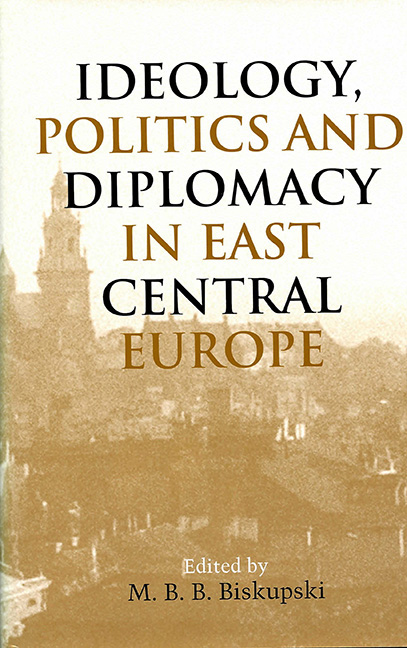Book contents
- Frontmatter
- Contents
- Preface
- Tabula Honoraria
- Piotr Wandycz
- Piotr Wandycz: An Appreciation
- 1 A Comparison of Czech Politics in Bohemia with Czech Politics in Moravia, 1860–1914
- 2 Strategy, Politics, and Suffering: The Wartime Relief of Belgium, Serbia, and Poland, 1914–1918
- 3 “This Troublesome Question”: The United States and the “Polish Pogroms” of 1918–1919
- 4 The Socialist Imprint on International Relations in Interwar Europe
- 5 Hungarian Americans during World War II: Their Role in Defending Hungary's Interests
- 6 The Nazi-Soviet Pact of August 23, 1939: When Did Stalin Decide to Align with Hitler, and Was Poland the Culprit?
- 7 Poland, the GDR, and the “Ulbricht Doctrine”
- Writings of Piotr S. Wandycz
- Contributors
- Index
6 - The Nazi-Soviet Pact of August 23, 1939: When Did Stalin Decide to Align with Hitler, and Was Poland the Culprit?
Published online by Cambridge University Press: 11 May 2017
- Frontmatter
- Contents
- Preface
- Tabula Honoraria
- Piotr Wandycz
- Piotr Wandycz: An Appreciation
- 1 A Comparison of Czech Politics in Bohemia with Czech Politics in Moravia, 1860–1914
- 2 Strategy, Politics, and Suffering: The Wartime Relief of Belgium, Serbia, and Poland, 1914–1918
- 3 “This Troublesome Question”: The United States and the “Polish Pogroms” of 1918–1919
- 4 The Socialist Imprint on International Relations in Interwar Europe
- 5 Hungarian Americans during World War II: Their Role in Defending Hungary's Interests
- 6 The Nazi-Soviet Pact of August 23, 1939: When Did Stalin Decide to Align with Hitler, and Was Poland the Culprit?
- 7 Poland, the GDR, and the “Ulbricht Doctrine”
- Writings of Piotr S. Wandycz
- Contributors
- Index
Summary
The official reason given by the Soviet government for the failure of Anglo-French-Soviet negotiations for a military and political alliance in late August 1939, was the refusal of Poland and Romania to allow the passage of Soviet troops through their territories in the event of a German attack on those countries. Soviet historians upheld that view, especially blaming Poland, but also accusing the Western powers of planning to set Germany against the USSR, and claiming that this situation gave Stalin no choice but to conclude a pact with Hitler. Although microfilm copies of the secret protocol to the Nazi-Soviet Nonaggression Pact of August 23, 1939, were found in western Germany at war's end, and were published in the West, Soviet authorities and historians consistently denied the protocol's existence, as did the commissar for foreign affairs, Vyacheslav M. Molotov, who signed it. It is clear, however, that high Soviet officials knew the German and Russian originals were kept in sealed envelopes in the Presidential Archives in the Kremlin where they were officially “discovered” in October 1992. Earlier, copies were found and verified in the archives, as admitted publicly in late December 1989.
The lively debate that took place on the pact among Russian historians in 1989, and carried on in Russian works published in the next few years, showed two schools of thought: one close to the former official interpretation, defending Stalin's policy, while the second condemned it along with other aspects of Stalinism. The 1989 debate began before the official acknowledgment of the existence of the copies and subsequently the originals of the secret protocol, though a selection of German and Soviet documents published that year clearly impelled this acknowledgment. Nevertheless, many Russian historians still believe that Western appeasement of Germany, and the Soviet need for time, left Stalin no other option than the pact with Hitler to ensure the country's security.
The policy of the Polish government, touted by Soviet historiography as the decisive factor in the failure of Soviet-Western military negotiations in August 1939, was viewed in the same way by some Western participants.
- Type
- Chapter
- Information
- Ideology, Politics, and Diplomacy in East Central Europe , pp. 147 - 226Publisher: Boydell & BrewerPrint publication year: 2003



